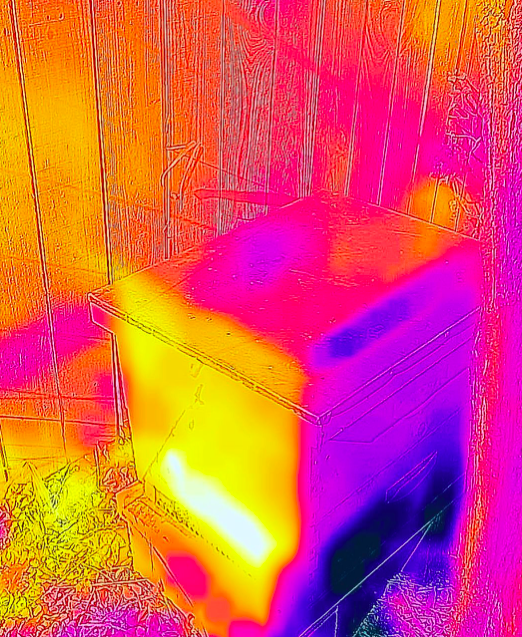Have you ever wondered what honey bees do in winter? Do they hibernate, do they migrate, do they die off? The answers to those questions are: not really, nope, and kind of.
Do Honey Bees Hibernate?
Not really. Honey bees do not hibernate in the literal sense, which involves lowered metabolic activity and body temperature, but they do greatly decrease their physical activity during winter. They don’t leave the hive when temperatures drop below 50°, living only off the stores of food they’ve built up over the warm months.
Do Honey Bees Migrate?
Nope. While honey bees do swarm and fly off during warmer months, even then they don’t travel migratory distances. In winter, they don’t fly at all except to relieve themselves on the rare warm winter day.
Do Honey Bees Die Off?
Kind of. During spring and summer, a honey bee colony consists of male drones, female workers, and the queen. When the cold starts to set in, though, the drones are kicked out of the hive and die off. This is because their one and only purpose is to mate with virgin queens, which only happens in warmer times. In winter, they’d just be eating up resources and not doing anything to maintain the colony.
So, How Do Honey Bees Survive Winter?
There are a few really crucial things that keep honey bees alive in frigid temperatures. The first is that winter honey bees are physiologically different from their shorter lived warm-weather sisters. Winter bees have more of a tissue called “fat body,” which allows them to live longer than spring and summer bees. Drastically longer. Warm-weather bees live about four to six weeks, while winter bees live about four to six months. This means that the hive doesn’t have to use their energy and resources to raise young during winter months.
The second crucial bit keeping honey bees alive all winter is their ability to keep themselves warm. They do this by forming a cluster. Picture a glob of bees about the size of a soccer ball or basketball and you’ll have a good idea what a cluster looks like. While in this cluster, the bees form two layers: an inner layer of bees producing heat by vibrating their wing muscles, and an outer layer that acts as an insulating layer. The queen remains at the center of the cluster, which the bees keep just the right temperature to preserve the eggs and sperm the queen carries with her (more on honey bee reproduction in a later post… I promise, this time). The center of the cluster stays around 92° all winter, with the bees rotating from the center to the outside and back so they all stay warm.
The third important piece for winter bees is their honey stores. Bees expend energy keeping the cluster warm, and they need to eat like any other living thing. This is what their stored honey is for. As the cold days wear on, the cluster moves together to their stores and eats through them, so it’s important that they have enough to last til spring. In Virginia, we like to be sure our hives have at least 40lbs of honey for winter, and that number is much higher in colder climes.
Winter Beekeeping
Here at NectarShare, we like to get the bees all tucked in for winter by early to mid December, depending on the weather in Virginia. Once they’re tucked in, we won’t open the hives again for at least a month (again, weather dependent). We know that during that time, the bees are clustered up and keeping themselves warm, and if we opened the hives we’d make their job a lot more difficult. During those weeks when we’re not opening the hive, we like to pop around to our various bee yards and get some thermal images to be sure the girls are staying warm enough. It’s fun to see how the cluster shifts over winter, gradually moving upward as it eats through honey stores. In these two thermal images from previous winters, you can see the cluster’s position in the hive (brighter colors = warmer). In the first image, the cluster is at the bottom of the hive, and in the second they’ve moved up into the honey super. In both images, the cluster is plenty warm, and positioned where it needs to be to access food.
Cluster in bottom
Cluster in top
.
As beekeepers, our winter work is minimal yet stressful. There isn’t much we can do for a hive that’s struggling at this point. We have to count on the fact that we’ve done our job well in previous months, and trust the honey bees to take care of themselves. They’re pretty good at it.




